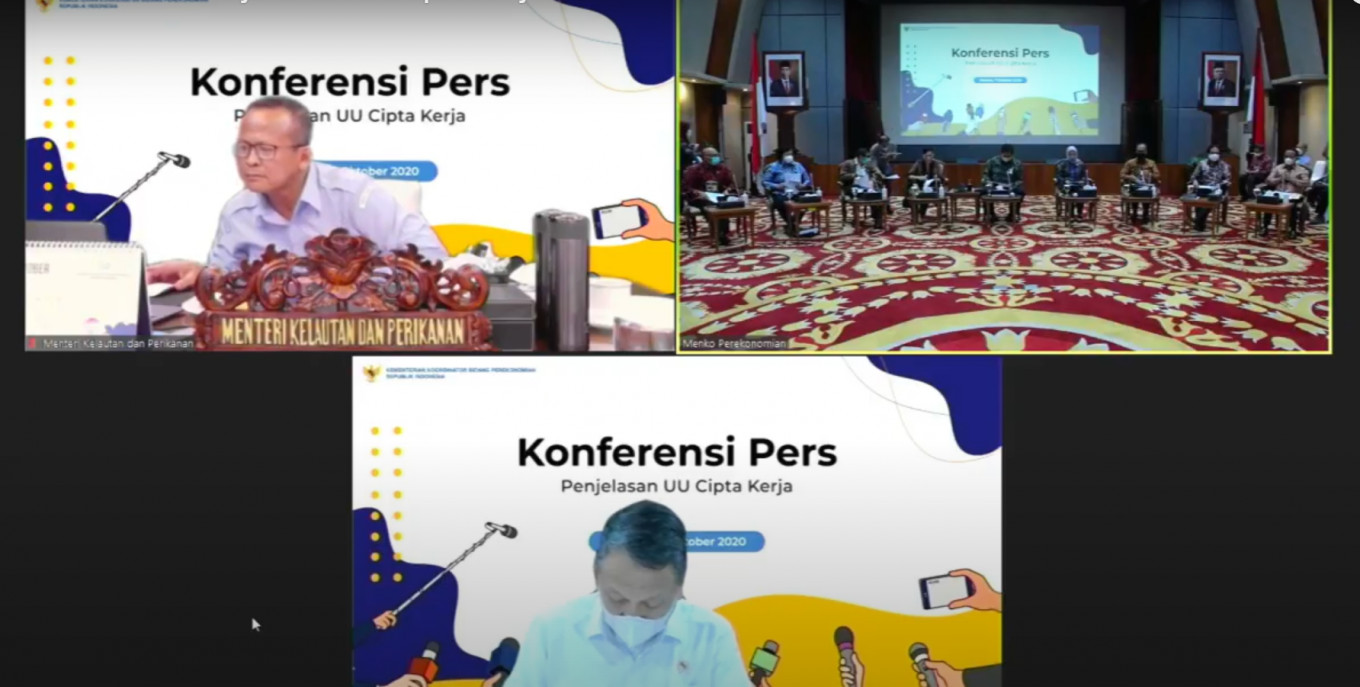Popular Reads
Top Results
Can't find what you're looking for?
View all search resultsPopular Reads
Top Results
Can't find what you're looking for?
View all search resultsGovt defends jobs law despite opposition
Ministers representing various portfolios from finance to labor and small businesses and the environment joined the briefing, each of them speaking from behind their masks as concern rose among the public about the implications of the law, passed on Monday by the House of Representatives.
Change text size
Gift Premium Articles
to Anyone
E
leven ministers in President Joko “Jokowi” Widodo’s administration convened on Wednesday, lining up to defend the controversial Job Creation Law in a joint press briefing broadcast live from the Coordinating Economic Ministry’s conference room, despite public unease about the newly passed law.
Ministers representing various portfolios from finance to labor and small businesses and the environment joined the briefing, each of them speaking from behind their masks as concern rose among the public about the implications of the law, passed on Monday by the House of Representatives. The omnibus law, which revises more than 79 laws and eliminates thousands of previous provisions, is aimed at boosting investment and creating jobs in Southeast Asia’s largest economy.
“We believe it’s important to provide the right information so as to avoid misinformation,” said Coordinating Economic Minister Airlangga Hartato, who had been in charge of the bill’s deliberation. “The Job Creation Law aims at simplifying, synchronizing and cutting regulations from a hyper-regulatory environment that can impede job creation.”
Manpower Minister Ida Fauziyah, Cooperatives and Micro, Small and Medium Enterprises Minister Teten Masduki, Environment and Forestry Minister Siti Nurbaya Bakar, Agrarian and Spatial Planning Minister Sofyan Djalil, Industry Minister Agung Gumiwang, Finance Minister Sri Mulyani Indrawati, Law and Human Rights Minister Yasonna Laoly and Investment Coordinating Board (BKPM) chairman Bahlil Lahadalia attended the meeting in the conference room. Maritime and Fisheries Minister Edhy Prabowo and Energy and Mineral Resources Minister Arifin Tasrif joined virtually.
Labor unions, activists and other civil society groups have been taking to the streets to oppose the law since its passage on Monday, as it could strip labor rights and pose environmental risks. They also claim the law did not go through a proper and transparent deliberation and legislation process, saying some articles were drafted without prior public consultation with relevant parties.
The National Police chief has issued an internal circular to counter protests against the law by carrying out “cyber patrols” and “media management” to control the narrative. The police have also called for early intelligence gathering to detect opposition within labor groups and the general public to prevent mass protests, claiming that such events could lead to “anarchy” and “social conflicts” in regions across the country.
In the air-conditioned conference room, Airlangga argued that to prevent Indonesia falling into the middle-income trap a lot of new jobs had to be created in the country, which is experiencing a “demographic bonus” whereby the productive population outnumbers that of nonproductive people.
“Every year, there are around 3 million people who need jobs, and especially during the COVID-19 pandemic the need to create new job opportunities has become more urgent,” said the Golkar Party politician.
Experts and foreign investors have said that although the law is expected to boost investment, the risks of environmental destruction and a lack of skilled labor could deter potential investors. Foreign funds might not immediately come flooding in, according to Fitch Solutions Asia country risk research head Anwita Basu.
“Indonesia still falls behind relative to the likes of Vietnam in the region because of the lack of scaled manufacturing capacity across sectors, quality of labor and an infrastructure deficit,” she told The Jakarta Post in an email correspondence on Tuesday. “Furthermore, the pandemic has made the timing of this move awkward.”
“With the COVID-19 crisis having devastating effects on Indonesia’s labor market, it is not surprising that the law is being interpreted as a means to make it easier to retrench workers without providing sufficient severance,” Basu said.
Indonesia had recorded more than 307,100 COVID-19 infections as of Tuesday, from around 200,000 in early September when relaxed movement restrictions implemented in various parts of the country failed to boost business and spending.
The country’s economy shrank 5.32 percent in the second quarter as consumer spending faltered and investment cooled. With another contraction projected for the third quarter, the government has forecast Indonesia will face its first annual recession since the 1998 Asian financial crisis.
Foreign investors prefer other destinations because of the uncertainty caused by layers of overlapping regulations and high labor costs with low productivity in Indonesia, said executive director for the British Chamber of Commerce in Indonesia (Britcham) Chris Wren on Tuesday.
“But with international investors now embarked on strategic global supply-chain risk management, Indonesia is right to have pushed [the law],” he told the Post. “Indonesia is now better placed to pitch [itself as] a genuine and realistic alternative to China and more investors should be willing to look at the Indonesian proposition in similar terms with Vietnam.”
The Indonesian Chamber of Commerce and Industry (Kadin) also welcomed the law, saying it would be a solution to issues hampering investment. “The coronavirus pandemic has had a harmful impact on the economy and businesses and thus the Job Creation Law is needed to support economic growth through recovery and transformation,” Kadin chairman Rosan Roeslani said in a statement on Monday.
If properly implemented, the law could help increase foreign direct investment into Indonesia over the medium term, said JP Morgan economist Sin Beng Ong. “The best measure of success would be in an increase in more stable capital flows, primarily direct investment inflows, which reduce the reliance on portfolio capital inflows,” he wrote in a note.
“This could fundamentally change the posture of Indonesia’s balance of payments in a manner that increases the speed limit on growth by reducing the external funding constraints and should also be apparent in increased stability in the currency.”
However, 35 foreign investors managing US$4.1 trillion in assets have warned that the Job Creation Law could bring about environmental risks for the country.
“While we recognize the necessity for reform of business law in Indonesia, we have concerns about the negative impact of certain environmental protection measures affected by the omnibus bill on job creation,” Netherlands-based asset manager Robeco senior engagement specialist Peter van der Werf said in a statement on Monday, Reuters reported.
The law might hamper efforts to protect forests, which would undermine global efforts to tackle climate change.
“While the proposed regulatory changes aim to increase foreign investment, they risk contravening international best practice standards intended to prevent unintended harmful consequences from business activities that could deter investors from Indonesian markets,” the letter read.










